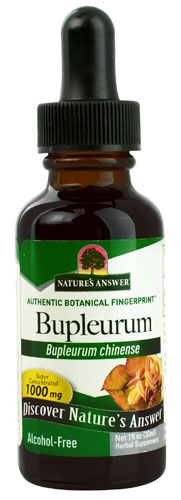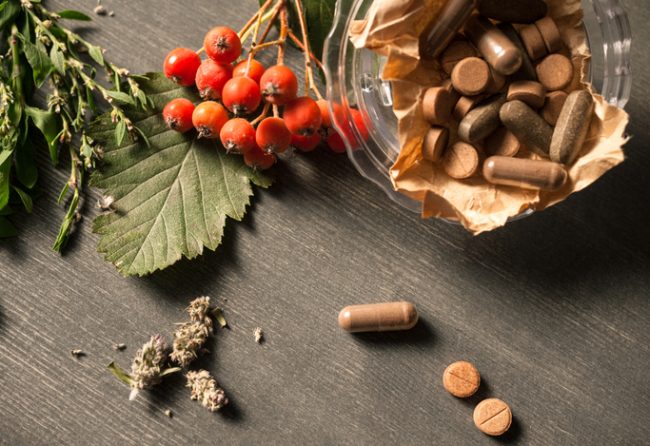We all know the basics of staving off the symptoms of menopause: Eat a healthy, plant-based diet, sweat on a regular basis, get adequate sleep and cope with stress constructively.
But what happens when our most virtuous endeavors to maintain our health (and keep those vexing discomforts at bay) don’t seem to make much of a difference in term of hot flashes, insomnia, weight gain, vaginal dryness—and moods that can swing faster and just as violently as a teenager’s?
While some who find themselves in this position may search for support in medical therapy, more and more women are finding relief from discomforts from alternative sources—37.4% of females, in fact, the National Institutes of Health reports.
And it’s no wonder. Herbal remedies for menopause—though not entirely infallible—can help ease the transition into menopause wherein reproductive hormones decline and menstruation ceases.
Considering a natural approach for relief for menopause discomforts? Here are four of the top herbal forms of assistance—and five ways to combat the big M’s discomforts organically:
1. Chaste tree berry
Dubbed by some as the “female-friendly fruit,” chaste tree berry—a small brown berry that’s been used by humans for over two centuries—can be a boon for women who are hitting or are in the midst of one of life’s biggest changes. Thought to operate by supporting women's reproductive health, chaste tree berry has been well studied for its ability to relieve discomforts associated with the menstrual cycle.†
Bonus tip: Sex drive stuck in neutral—or worse? Consider adding basil to your next dish. According to Healthline, it provokes the senses (and not just in terms of smell and taste).
2. Black cohosh
Hot flashes are inarguably one of the most exasperating parts of menopause. Fortunately, from a naturopath’s perspective, there are myriad things a woman can do to thwart these “power surges”—and one of the most well known is to try a black cohosh supplement. Called “fairy candle” and “black snakeroot” by some, this North American plant may help support a woman's body during natural transitional hormonal states.†
Bonus tip: Fill your plate with summery foods such as watermelon, tomatoes, seaweed, tofu, spinach and apples. Traditional Chinese medicine deems this eats “cooling foods” because of their natural ability to cool the body. Likewise, consuming foods and beverages that are considered "warming" or "hot" in Chinese medicine can aggravate menopausal symptoms, and include onions, pumpkin, cauliflower, glutinous rice, black pepper, cayenne pepper, cinnamon, coffee and alcohol.
3. Bupleurum (and other Chinese herbs)
Closely associated with the liver, bupleurum has been used in Traditional Chinese Medicine for more than 2,000 years because it’s believed to support the flow of “qi” and help diminish heat in the liver. For menopausal women, it has the potential to naturally encourage a better frame of mind—a windfall during a life transition that’s marked by anger and frustration.†
Bonus tip: Bust out those kettlebells and running shoes—regular exercise is vital to keeping the mood swings that may arrive with menopause at a minimum. (Hello, endorphins.) Regular physical activity also improves sleep, and a Swedish study found that it decreases hot flashes and reduces night sweats in menopausal women.
4. Red clover
During menopause, a woman’s estrogen levels dip—thus leading to a litany of complaints that can range from those aforementioned hot flashes to headaches and a general state of malaise. In recent years, red clover has begun to receive increased attention, in that the plant contains isoflavones (plant-derived compounds that mimic estrogenic activity) that may organically support women's health during menopause.†
Bonus tip: Halt the noise. The National Institutes of Health confirms what we already know—that noise (from construction, gardening, traffic, kids, ringing phones, blaring TVs and good, old-fashioned life) can trigger headaches. Silence your phone, declare it a television-free weekend and seek out serenity in nature.
In the quiet, you may come to know that the best relief for menopause comes with mental strength: “Mental attitude has a lot to do with how well a woman adjusts to menopause,” Dr. Weil reminds us. “If it is seen as a tragic end to youth, fertility and sexuality, it can cause significant disruptions in one’s day-to-day life, and create the temptation to “solve” the problem with unproven menopause treatments such as therapies that promise eternal youth. If menopause is seen as simply the natural transition to the next phase of life, it can be readily accepted and more easily handled.”
†These statements have not been approved by the Food and Drug Administration. These products are not intended to diagnose, treat, cure or prevent disease.




